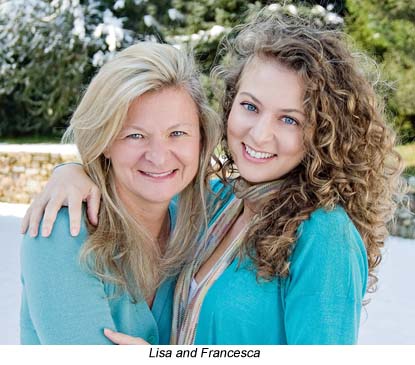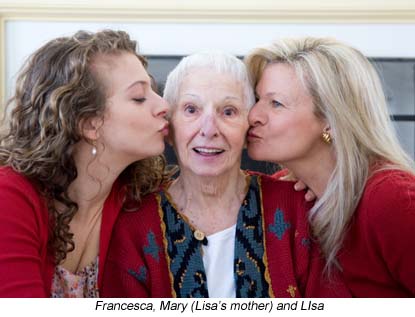
Location: Philadelphia, PA
Age: 55
Marital Status: Divorced
Education: B.A. in English from University of Pennsylvania, J.D. from University of Pennsylvania Law School
Lisa, whose books have appeared on the New York Times Bestseller list seventeen times, is Francesca’s “cheerleader,” inspiration, confidant and now… coworker. This fall, the two released a book, My Nest Isn’t Empty, It Just Has More Closet Space, a collection of 70 sassy essays about family, love and womanhood, compiled from the “Chick Wit” column they wrote for the Philadelphia Inquirer.
“When Francesca began writing with me, it made everything kaboom,” says Lisa. “It ended up being about generations, which is unique in the marketplace. There aren’t many mother-daughter writer teams.”
And unlike television’s Gilmore Girls, which was cancelled after several seasons, there’s no stopping this mother-daughter team. The two have three more books like My Nest in the works.
How did you two start writing your “Chick Wit” column together for the Philadelphia Inquirer?
LISA: It just kind of evolved organically. I went to the newspaper originally, they didn’t approach me. Do you recall Erma Bombeck?
Oh, of course.
LISA: I loved her. I thought, ‘The newspaper today, it’s all grim news. Where are women’s voices?’ I wanted to be that voice, and they let me. A lot of my writing was about my daughter and my mom. I said to Francesca, who was still in college at the time, ‘you should tell your side because the readers are e-mailing me and asking me.’
FRANCESCA: I started contributing to her columns while I was still in college. Since I’ve graduated, I contribute more regularly.
How often does that column come out?
FRANCESCA: It’s a weekly column and I probably contribute about every fifth week.
Francesca, what was it like growing up with a best-selling mother? Are you two close?
FRANCESCA: She and I–that’s been the core relationship in my family for all of my life. I hardly remember she and my dad living together. And then my mom was remarried to my stepfather. They’re not married anymore.
Francesca, you went to Harvard and studied English. Did you want to be a writer? Is it in your genes?
FRANCESCA: It’s something I always enjoyed but growing up with my mom and seeing her go through her earlier struggles of trying to become a writer, then finding her stride and finding success gave me the courage to try.
LISA: Francesca has been writing since she was little and I don’t take credit for her ability. She has developed her own voice and has worked hard.
Is Francesca working on another book on her own?
FRANCESCA: I am working on a novel that I hope one day gets published. Fiction is my dream… but this fun little jaunt of memoir writing about family has been such a joy.
Do you think the relationship between moms and daughters existed this way years ago?
LISA: Well, I was close with my mom but definitely, nobody was writing about it. Until it’s written about, you can’t get the commonality of experience. As soon as I write ‘Oh my mother has a 30-year-old bra,’ a lot of women will say, ‘I totally get that, and my mom has one that’s ten years old.’
FRANCESCA: I’m very close to my mom, I speak to her on the phone everyday and it’s actually not that unusual. A lot of my friends–boys and girls–are very close to their moms. I don’t know if its the new technology or if it’s just a different style the way we were raised.
What’s the greatest thing you’ve done for each other and what’s the worst error you made with each other?
LISA: Wow, that’s hard. I think the best thing I’ve done is to get out of her way. Maybe because it was a single parent situation, but we didn’t have a lot of the control fights that some people have. If she wanted to wear a Cinderella outfit when she was two, that was fine with me. She was allowed to make her own decisions from an early age, and with more practice she got the better. I haven’t needed to be all over her with rules, and she turned out great. What’s the worst thing? I would say the flip side of the same coin. When you don’t give rules, you have more anxiety.
What have you had anxiety about?
LISA: Here’s an example. I got an email from her the other weekend saying, ‘Don’t worry, but I’m not feeling that great.’ She was having pretty severe stomach pains. I said to her, ‘Do you need to go to the hospital?’ She said, ‘I’ll keep you posted.’ And I’ve got to tell you, I sat for an hour thinking, ‘Please, please, please decide to go to the hospital.’ She didn’t end up going, the pains passed. I stepped back a little and gave her the authority, but it makes you anxious as a mom. If you’re not going to be a control freak, you’re not going to be in control.
FRANCESCA: I agree. It is the best thing that she did for me and I feel incredibly fortunate that she didn’t try to control me. When I was in college, I felt anxious that she would be alone in the house. But she has always kept boundaries so it hasn’t become a codependent relationship. I think that’s difficult and brave of her.
Francesca, tell me what you learned from your mom.
FRANCESCA: How to find and create your own happiness. When I was born, she fell on hard times–got divorced from my dad. But she said, you know what, I’m gonna pursue my dream now. And I saw her write an entire first novel that didn’t get published and then just sit down and write a second one. She persevered. That has been so empowering because I know that if I experience bumps along the way, it’s not the end of the story.
Lisa, tell me what you’ve learned most from Francesca.
LISA: I’m learning a lot from this interview.
What about from your own mother, Lisa?
LISA: Perseverance. My mother came over from Italy and worked as a secretary at a time when women were not supposed to be in the workplace. I always saw her work really hard and struggle. She had a hard life but those setbacks never defeated her. And at 86, she’s kind of invincible now.

Has she inspired your writing?
LISA: Absolutely. We don’t really revere moms the way we should. We talk about the power of Fortune 500 companies, but I think real power is at a kitchen table. Your mother influences you in ways that you probably are still figuring out, just as mine did, just as Francesca will figure out too.
Francesca, what’s the greatest thing you’ve done for your mom?
FRANCESCA: I accepted her as an aly early on. Sometimes the teenager phase is about viewing the parent oppositionally, and I just didn’t experience that. I understood from a young age that she was on my side. Not that she was my best friend, letting me do whatever I wanted, but we were on the same team.
LISA: Right. Before I released the book, I wanted to go on Twitter and say ‘the new book is coming out tomorrow.’ And I said, ‘Ugh, I don’t know how to edit my profile.’
FRANCESCA: When I was in high school I would’ve been snippy about it like, ‘Oh come on! You know how to do it.’ But now I say, ‘Okay, I’ll do it for you, Mom.’
Lisa, why you think you’re successful as a writer?
LISA: My mother’s advice always in my life was ‘be yourself.’ And I think I am. My voice, like the voice I’m talking to you now in, is the voice you hear when you read my novels and my memoirs.
Your writing is so funny. Do you consider yourself a funny person?
LISA: I think most women are funny. All of my girlfriends are funny and Francesca is really funny. I think smart women tend to have a good sense of humor.
Why do you think most women are funny?
LISA: Women have to get everything done, whether it’s grocery shopping, going to the office or making sure the kids bathe. You know things are going to go wrong, so humor becomes a coping mechanism. I listen to what women are joking about; that they can’t fit into their jeans, that the roots of their dyed hair show. We have a great ability to laugh at ourselves and we have a great ability to use humor to get through our hardships.
Of all the books that you’ve written, what’s your favorite?
LISA: I like the one I just wrote called Save Me, a story about mothers and daughters that’s not even out yet. I really take the craft of writing seriously and I try to improve it. Seventeen novels in 17 years — I always think the newest one is the best.
Another book about mothers and daughters?
LISA: It’s ironic in a way, now that Francesca has moved out and is on her own, I think about our relationship more.
Francesca, do you have a favorite book of your mom’s?
FRANCESCA: I used to love Vendetta’s Defense, because it’s historical, but I think my new favorite is Look Again. It’s about a relationship between a mother and her adopted son. It was just really interesting; it was emotional; it touched me.
There’s no question, your literary voices are different.
LISA: That’s an important point about Nest, because we both wrote those essays. We do not edit each other’s work at all. So all of her work, it stands on its own. She has her own voice.
FRANCESCA: I know that you can always find a critic and you can’t always find a great mom. When I call her and go, “Ugh, I suck,” she says, “No honey, no you don’t,” instead of saying, “But on page 38…” I like the support.
Lisa, what are your favorite books that are not your own?
LISA: I love memoirs, so I loved Angela’s Ashes. It’s beautifully written. It’s really about a mother’s devotion. She wasn’t perfect but she was a perfect mom in a way.
And what about you, Francesca?
FRANCESCA: I love the short fiction of Graeme Greene. His short stories have a prose style that I admire so much; so simple but such emotional punch. The Sound and the Fury is one of the most remarkable books ever written and all of the women in it are so damaged and damaging to everyone around them. So many of my favorite books are about really bad mothers, maybe because I didn’t have one!
Lisa, I love the idea of the annual book club dinner party you throw at your home. What made you think of that?
LISA: I noticed a lot of book clubs were reading my stories. I wanted to reward and encourage that. I don’t know how to do that other than throw a big party and feed them. That’s what I do. I’m an Italian mother.

